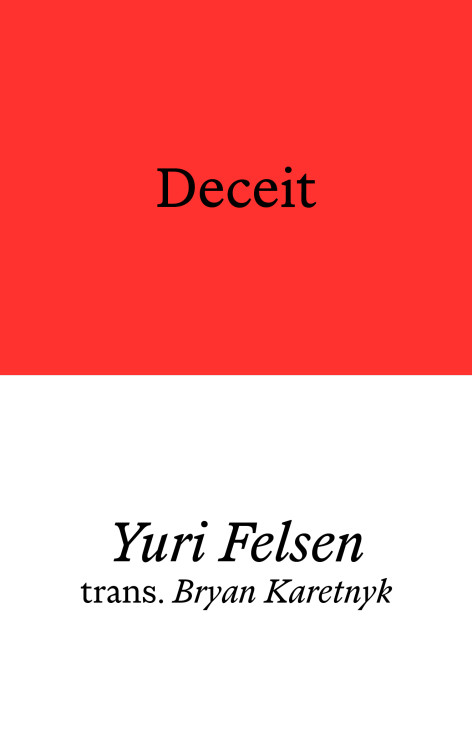

Deceit

Appearing for the first time in English, Deceit is the debut novel by Yuri Felsen, a leading modernist writer of the interwar Russian diaspora. Known by his contemporaries as ‘the Russian Proust’, Felsen died in the gas chambers at Auschwitz, his life and legacy destroyed by the Nazis.
Written in the form of diary, Deceit is a psychological self-portrait of an unnamed narrator, a neurasthenic and aspiring author, whose often-thwarted pursuits of his love interest and muse provide the grounds for his beautifully wrought extemporizations on love, art and human nature. Modulating between the paroxysms of his tormented romance and his quest for an aesthetic mode befitting of the novel he intends to write, Deceit is a remarkable work of introspective depth and psychoanalytic inquiry.
Like voyeurs, party to his most intimate thoughts, we accompany the diarist as he goes about Paris, making enraptured preparations for the materialisation of his fantasy, observing not only his eagerness, dreaminess and poetic inclinations, but also his compulsive desire to analyse his surroundings and self. Yet amid these ravishing flights of scrutiny we discern hints of his monomaniacal tendencies, which blind him from the true nature of his circumstances. Thus begins an exquisite game arranged by the author, wherein it falls to the reader to second-guess the essence of what really lies behind his narrative.
With a Foreword by Peter Pomerantsev and an Afterword by Bryan Karetnyk
‘The miracle of Yuri Felsen is how his apparently Nabokovian rhythms lull you into a false sense of security, before a sudden and chilling exposure to the weather of a walk where the whole elegantly interwoven conceit of the narrator is ripped apart. And the pain of someone like Walser glints through a decadent surface of exiled life in Paris, to hint at darker shadows to come.’ – Iain Sinclair
‘Towards the end of this strange novel in the form of a strange diary the narrator declares that “it is impossible to live without deceit”. What has preceded this bald statement is the work of a connoisseur of deceit in its multitudinous forms, the most potent being a subset of self deceptions described in painful raw detail. It’s a work steeped in absolutely joyous misery.’ – Jonathan Meades
‘Dark thickets of language part to reveal a pearl of psychological prose and a highly actual account of the psychic impermanence of migration.’ – Sasha Dugdale
‘Deceit is a strange and beautiful dream, an intimate and tragic love letter from a lost world.’ – Camilla Grudova
